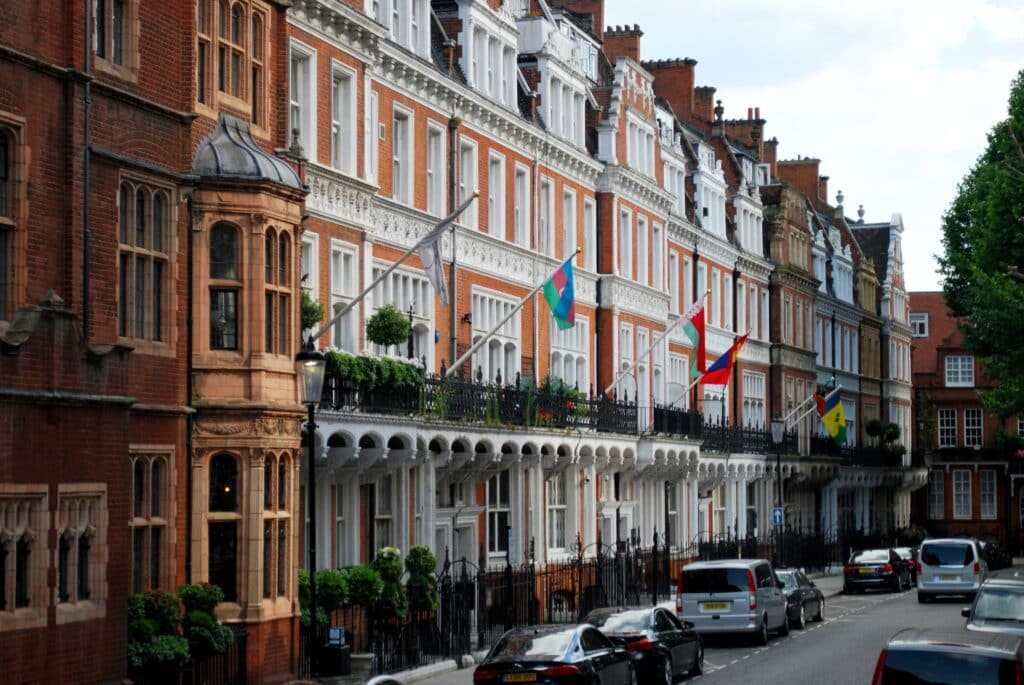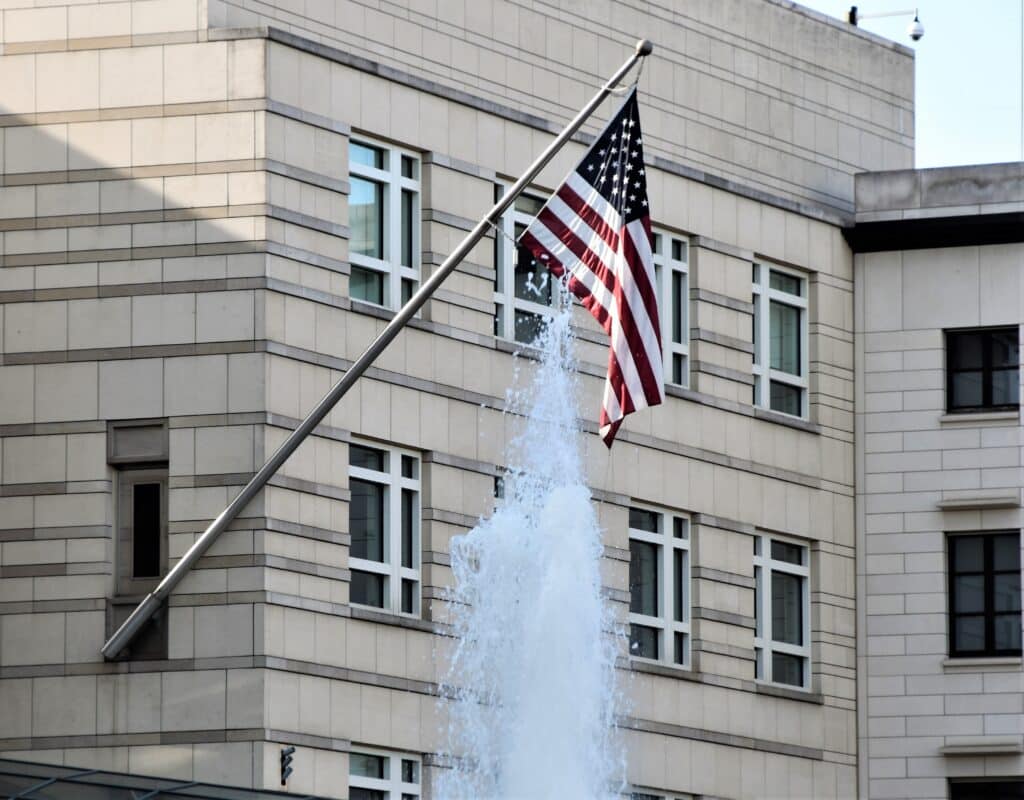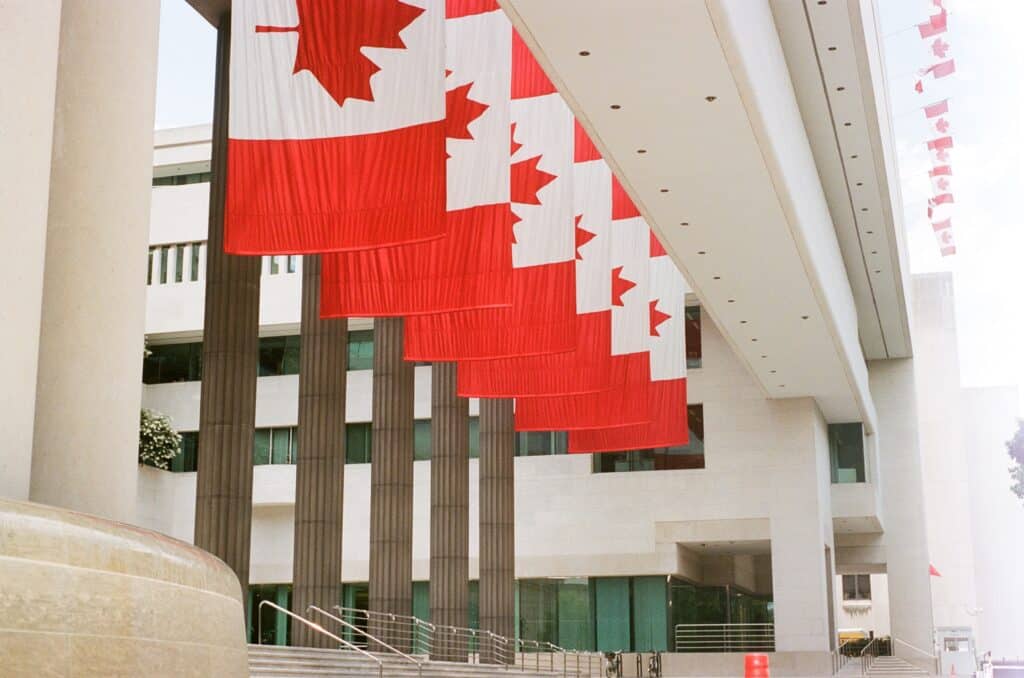
Embassies and consulates allow countries to talk to each other easily and provide essential functions for citizens, tourists, and visitors.
At Remitly, we know that embassies and consulates are important, particularly if you need a visa or live in a separate country from your family. Distinguishing between the two can be confusing, especially when some use the terms interchangeably, so here’s an easy guide to understanding their differences.
Is a consulate the same as an embassy?
Simply put: a consulate is not the same as an embassy. If you zoom out and look at them in the bigger picture, they both push for the broader ideas of cultural and economic diplomacy, travel, and otherwise, making sure countries stay friendly with one another.
But when you look closer, embassies and consulates serve wholly different functions.
An embassy handles diplomatic relations and is led by an ambassador. A consulate provides citizen services and is overseen by a consul.
What is an embassy?
An embassy is the primary form of diplomatic representation comprising diplomats and representatives serving within a foreign country. It’s the main point of contact between two governments (the home government and the foreign government). Most embassies are headquartered in a country’s capital city.
Embassy headquarters are considered “foreign soil,” meaning they operate under the home country’s laws, not the host country.
What is the purpose of an embassy?
The embassy serves a variety of functions involving broader state politics that probably won’t affect you. For example, embassies arrange state visits involving high-profile people, and they’re involved in preparing treaties between the two countries.
For travelers and non-citizens, embassies are a direct link to your home country. When traveling, you might seek aid from an embassy if you:
- Have been arrested or detained
- Lost your passport
- Have been a victim of a crime
- Experienced a natural disaster or civil disorder
- Have a relative that has gone missing abroad
What is an ambassador?
The ambassador is the primary spokesperson and chief diplomat within an embassy. They are the highest-ranking representative of a home nation within a host country. They provide guidance on foreign policy and participate in negotiations or mediation between the host and home countries.
Most importantly, ambassadors act as the official liaison, ensuring the steady flow of information between the host and home countries. They send regular reports about the host country’s political, cultural, and economic conditions and provide any necessary information from the home country to the host country.
Why does a country have an embassy?
Embassies play an important role in diplomacy. They help to maintain peace between countries while fostering collaboration. It’s ultimately a symbiotic relationship that can help to build political and cultural relationships between nations.
Embassies also provide protection to citizens of a home country who are living, working, or traveling abroad.
Do all countries have a U.S. embassy?
Nearly all countries in the world have a U.S. embassy or diplomatic mission. However, some countries don’t have an embassy because they don’t have any diplomatic relations with the U.S. This includes:
- Bhutan
- Caribbean Islands
- North Korea

What are consulates?
While embassies are the primary diplomatic entity, consulates act as an extension of the embassy. In larger countries, you’ll likely see an embassy in the capital city and consulates in other major cities that are hubs for tourism or trade.
What is the purpose of a consulate?
Although consulates still play an important role in foreign diplomacy, they’re more involved with administrative duties, like providing information about immigration and processing visas. They’ll also typically be the ones to help replace a lost green card or renew passports for citizens of their home countries.
Basically, if you’re an expat or traveler, you’re more likely to find everyday assistance for non-emergencies via a consulate than an embassy.
What is a consul general?
A consul is a government representative who lives in a foreign country and serves general diplomatic functions. A consul general is the highest form of a consul and acts as the chief person at a consulate. Similar to an ambassador for an embassy, a consul general is the head member of a consulate.
A consul general follows the instructions of an ambassador, often carrying out more of the day-to-day work required to, for example, enact new foreign policies suggested by the ambassador.
Why does a country have a consulate?
Consulates are still important to general diplomacy, but their role is more focused on administrative duties and representing the general population of the host country.
Some embassies do offer administrative services, but that’s not always possible given the size of the country or the scope of an embassy’s work.
A consulate can take some of the more essential, everyday work involved with assisting tourists and expats, allowing embassies to focus on larger diplomatic functions.
Do all countries have a U.S. consulate?
As of this writing, the U.S. has 88 consulates in the world. Based on the size of the host country and other variables, some countries only have an embassy. Countries without an embassy (like those listed above) also do not have a consulate.
What is a diplomatic mission?
A diplomatic mission refers to an organization or group of people sent to a host country to represent a different country.
For example, if the United States sent a select group to Japan to discuss trade, that U.S. group would be considered a diplomatic mission.
Most of the time, when you hear “diplomatic mission,” it’s in reference to embassies and consulates. Both are types of state representation existing in their non-home state.
What are the types of diplomatic missions?
Although embassies and consulates are the most common diplomatic missions, they’re not the only types of diplomatic missions. Other diplomatic missions that you might hear about include:
- High commission – An embassy of a Commonwealth country located within another Commonwealth country
- Permanent mission – A diplomatic mission to an international organization (like the United Nations, NATO, or World Health Organization)
- Consulate General – A diplomatic mission that exists in a major city and provides a full range of services
- Consulate headed by honorary consul – A diplomatic mission that is led by an Honorary Consul but provides limited services.
This is good to know, but don’t worry about it too much. For the average person, you’ll only really deal with embassies and consulates.

Visa and passport services at embassies and consulates
Traveling abroad or settling in a new country? Then you’re likely to visit an embassy or consulate for visa and passport services. These key functions are among the most sought-after services provided by these institutions.
Embassies: Passport renewals and more
If you’re a U.S. citizen abroad and your passport has expired, lost its way, or encountered an untimely demise, the embassy is your go-to place.
Not just for renewals, embassies can issue emergency passports if you find yourself in a pinch. They are also crucial if you need to report a lost or stolen passport, ensuring you’re not left stranded.
Consulates: visa processing experts
Dreaming of exploring the U.S. or taking up a job or study opportunity? A consulate is where your journey begins. Here, visa applications for non-citizens are processed.
Whether it’s a tourist visa, student visa, or a work permit, consulates handle the applications, interviews, and all the nitty-gritty details.
Can I apply for a visa at an embassy or consulate?
One of the main functions of an embassy and consulate is to provide visas. Ideally, you want to get a visa before you arrive in a new country, but emergencies happen, and plans change.
Once you depart your home country, an embassy or consulate is your best route for getting a visa. The process is still the same and typically includes an interview, fee, and documentation.
How do countries establish diplomatic relations and open embassies or consulates?
Establishing mutual diplomatic relations is a complex process without any singular step-by-step process. It can take decades of exchange and communication to simply establish the most basic diplomacy with another country. Mutual consent is the key here.
Once that diplomatic relationship has been created, the countries can begin discussing opening embassies and consulates. The process for establishing an embassy is outlined via the Vienna Convention on Diplomatic Relations and Optional Protocols from 1961, but the basic process involves:
- Negotiating the privileges, immunities, and other conditions for setting up embassies and consulates.
- Identifying locations for potential embassy headquarters. Both the host and home countries must approve.
- Creating new infrastructure or renovating existing buildings to meet functional and security needs.
- Appointing an ambassador, consuls, and other staff members. The host country must approve of an appointed ambassador, and they are allowed to refuse a potential appointee without reason.
How do embassies and consulates protect their citizens abroad?
Protecting citizens abroad is one of the main roles of embassies and consulates. Much of that involves smaller administrative functions, like providing emergency passports, notarizing documents, and assisting with marriages and births.
While you shouldn’t treat an embassy or consulate like your personal customer service, they can definitely provide help or point you in the right direction in the event of an emergency. For example, an embassy can advocate for your rights within the host country’s laws and notify your family members if you have been arrested or detained.
If you are a victim of a crime, an embassy can provide legal and medical assistance, and during emergencies, an embassy can assist with evacuation.
You generally cannot transfer or exchange money at an embassy or consulate. However, an embassy can help a destitute citizen return to their home country under certain circumstances.

Emergency situations: How embassies and consulates can help
When you’re abroad, emergencies can happen. It’s reassuring to know that embassies and consulates are your allies during these times. Their assistance can be invaluable, whether it’s a lost passport, a legal issue, or a crisis.
Embassies: Lifeline in a crisis
Imagine facing a serious medical emergency or getting caught in a political upheaval. Or what if you’re a victim of a crime? In such high-stress situations, the embassy is your sanctuary. They can help you connect with local authorities, provide vital information on medical facilities, and offer guidance on navigating the local legal system. In extreme cases, like natural disasters or civil unrest, your embassy is the go-to for evacuation assistance.
Consulates: Providing local support
Consulates, with their presence in various cities, can be more accessible in emergencies. They’re equipped to assist in situations like the loss or theft of a passport, offering temporary travel documents to help you get back home safely. Need legal advice or emergency funds? Consulates can guide you on these too.
List of countries with a U.S. embassy in 2024
- Afghanistan
- Albania
- Algeria
- Angola
- Argentina
- Armenia
- Australia
- Austria
- Azerbaijan
- Bahamas
- Bahrain
- Bangladesh
- Barbados
- Belarus
- Belgium
- Belize
- Benin
- Bolivia
- Bosnia and Herzegovina
- Botswana
- Brazil
- Brunei
- Bulgaria
- Burkina Faso
- Burma (Myanmar)
- Burundi
- Cabo Verde
- Cambodia
- Cameroon
- Canada
- Central African Republic
- Chad
- Chile
- China
- Colombia
- Comoros
- Congo (Democratic Republic of the)
- Congo (Republic of the)
- Costa Rica
- Côte d’Ivoire
- Croatia
- Cuba
- Cyprus
- Czech Republic
- Denmark
- Djibouti
- Dominican Republic
- East Timor (Timor-Leste)
- Ecuador
- Egypt
- El Salvador
- Equatorial Guinea
- Eritrea
- Estonia
- Eswatini
- Ethiopia
- Fiji
- Finland
- France
- Gabon
- Gambia
- Georgia
- Germany
- Ghana
- Greece
- Grenada
- Guatemala
- Guinea
- Guinea-Bissau
- Guyana
- Haiti
- Holy See (Vatican City)
- Honduras
- Hungary
- Iceland
- India
- Indonesia
- Iran
- Iraq
- Ireland
- Israel
- Italy
- Jamaica
- Japan
- Jordan
- Kazakhstan
- Kenya
- Korea (South)
- Kosovo
- Kuwait
- Kyrgyz Republic
- Laos
- Latvia
- Lebanon
- Lesotho
- Liberia
- Libya
- Lithuania
- Luxembourg
- Madagascar
- Malawi
- Malaysia
- Maldives
- Mali
- Malta
- Marshall Islands
- Mauritania
- Mauritius
- Mexico
- Micronesia
- Moldova
- Mongolia
- Montenegro
- Morocco
- Mozambique
- Namibia
- Nepal
- Netherlands
- New Zealand
- Nicaragua
- Niger
- Nigeria
- North Macedonia (formerly Macedonia)
- Norway
- Oman
- Pakistan
- Palau
- Panama
- Papua New Guinea
- Paraguay
- Peru
- Philippines
- Poland
- Portugal
- Qatar
- Romania
- Russia
- Rwanda
- Samoa
- San Marino
- Saudi Arabia
- Senegal
- Serbia
- Seychelles
- Sierra Leone
- Singapore
- Slovakia
- Slovenia
- Somalia
- South Africa
- South Sudan
- Spain
- Sri Lanka
- Sudan
- Suriname
- Sweden
- Switzerland
- Syria
- Tajikistan
- Tanzania
- Thailand
- Togo
- Tonga
- Trinidad and Tobago
- Tunisia
- Turkey
- Turkmenistan
- Uganda
- Ukraine
- United Arab Emirates
- United Kingdom
- Uruguay
- Uzbekistan
- Venezuela
- Vietnam
- Yemen
- Zambia
- Zimbabwe
Please note that the presence of an embassy can change due to diplomatic relations, and for the most current information, refer to the U.S. Department of State’s website.
